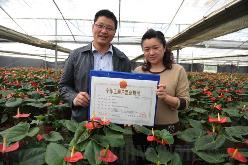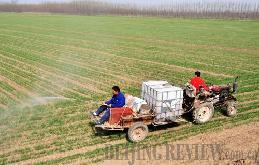|
 |
 |
|
PROUD FAMILY: Yu Yongjun and his wife show off the business license for their family farm in Yangjian Town, Jiangsu Province, the first of its kind in the province, on March 7 (SHEN PENG) |
FIELD OF HOPE: Guo Niantong (left) and a family member spray pesticides in a wheat field run by his family farm in Zouping County, Shandong Province, on March 26 (XINHUA) |
A role model
As a pilot area, Shanghai's Songjiang District—traditionally a major granary for the city—started experimenting with family farm development in 2007.
It is an attempt to improve the scarce agricultural production left by those who have moved to major cities by sharing the knowledge of experienced and creative farmers, the local government said.
According to the local government, about 90 percent of rural residents had non-agricultural jobs in Songjiang in 2007. Only 6.6 percent, or 12,500 people, were directly engaged in farming.
"The key point in tackling the labor shortage remains how to raise farmers' incomes. Once people discover that farming brings a much higher return than working in a factory, it will become a more attractive option," said Xu Aifang, Deputy Director of the Agriculture Office of Yexie Town in Songjiang.
Today, around 80 percent of the 9,100 hectares of arable land in Songjiang is operated by about 2,000 family farms.
In the district's Maogang Town, 162 families rent plots of land ranging between 5 and 13 hectares each. One plot belongs to Zhang Xiaodi and his wife. Now 49, Zhang Xiaodi worked as a carpenter and a driver before finally settling on farming.
Chen Jiming, deputy head of the Huangqiao Villagers' Committee, praises Zhang Xiaodi for his brilliant approach to farm work. His findings, such as sowing rice before June 10 would produce higher yields, have benefitted many local farmers, Chen said.
In Songjiang, the operation of family farms has increased the average rice yield per hectare by 570 kg from a decade ago, according to the Songjiang Agriculture Commission.
Larger-scale family operations allow manpower to reach full potential and ensure decent incomes for farmers. Family farms should guarantee twice the incomes people earn in cities, otherwise no one will want to do it, officials with the commission said.
The net income of Zhang Xiaodi's family last year amounted to 200,000 yuan ($32,000), 80 percent of which came from rice production. That's higher than the average salary earned by local civil servants, according to Chen.
In 2012, the average per-capita income on family farms that produce grain and raise pigs reached 50,000 yuan ($8,000), while other rural residents earned no more than 18,000 yuan ($2,900). The gap is even larger when preferential policies for family farms such as subsidies are included.
Jiang Yongqiu, 58, is an experienced tractor driver and rice farmer in Songjiang's Tongjian Village. He said that he earned more than 80,000 yuan ($13,000) planting rice on his family farm last year. The sum was something he had dared not to imagine before, having earned a minimal wage for most of his life.
Jiang has been renting land from the 40 families in his village since 2007. The rent is 10,500 yuan ($1,685) per hectare, but he receives 9,150 yuan ($1,469) per hectare in subsidies, paid to encourage the growth of family farms. "The cost of the land is almost totally covered by the government," he said.
However, when the pilot program launched, few people were willing to join, largely because of concerns about the relatively large input required for farmland of more than 7 hectares and concerns about the duration of the government's subsidy policy, said Xu.
"But too many people are applying to join the program these days and we have had to raise the qualification requirements to select qualified operators," she said, adding that young or middle-aged rural dwellers with agricultural experience are the preferred applicants.
According to the Songjiang Agriculture Commission, the district prohibits family farms from employing non-family members. Zhang Xiaodi said that he was hesitant at first, as two people cannot handle all the work during a busy season, but his doubts disappeared after regulations allowing temporary employment were introduced.
The district has also established strict standards for husbandry on family farms. "If standards are not met, subsidies are reduced, and inspections are frequent," the commission said.
However, the length of leases and the scale of family farms remain controversial issues in the pilot scheme. Sun Hongrong, a younger family farm operator in Tongjian Village, hopes the government will extend the term of land-transfer contracts. "A 10-year contract would be ideal," he said.
"Furthermore, if we can contract a larger area of land, it is also good for economies of scale, which is more efficient," he said.
Although official guidelines clearly state that only families with rural residence permits, or rural hukou, can join the program and full-time employment of non-family members is forbidden, industry insiders said that it is not unusual for city-based companies to enter the program.
"The guidelines are intended to prevent profit-oriented companies from 'stealing' the land by building houses or developing agritourism, and thus threatening the security of the grain supply. However, the laws need to be stringent to prevent unscrupulous companies from doing illegal operations," said Cheng Cunwang, Chairman of the Tianyuan Zhengguo Bio-agriculture, an organization that promotes community-supported agriculture.
Sun said that regulation of family farms is essential to prevent the overuse of land and depletion of soil nutrients. It also helps to keep the land free from pollution caused by inappropriate disposal of plastics or the excessive use of fertilizers.
Email us at: yinpumin@bjreview.com | 